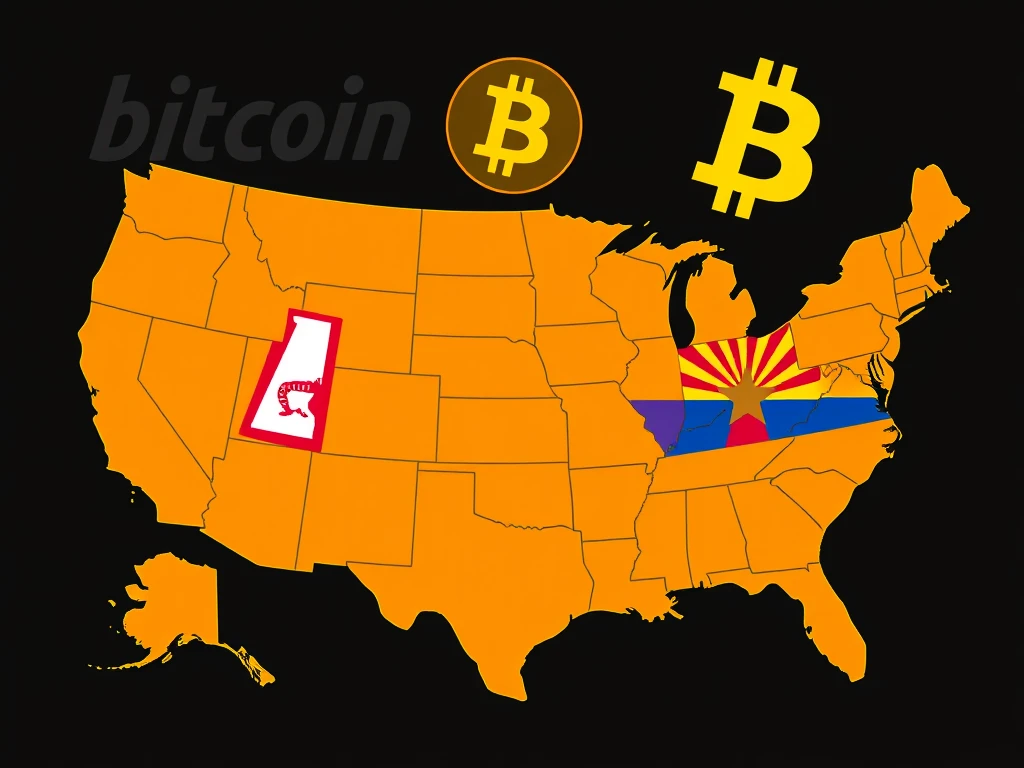Revolutionary Bitcoin Reserves: Alabama & Minnesota Lead US States Crypto Charge

Exciting developments are unfolding in the United States as more states explore the potential of Bitcoin reserves! Alabama and Minnesota have boldly stepped into the arena, joining a growing number of states considering integrating Bitcoin into their financial strategies. Are we witnessing a groundbreaking shift in how states manage their assets in the digital age? Let’s dive into the details of this fascinating trend.
The Rise of Bitcoin Reserves in US States: A Strategic Move?
Across the United States, a significant trend is emerging: states are increasingly considering the adoption of Bitcoin reserves. This isn’t just a fleeting interest; it’s a strategic exploration of how digital assets like Bitcoin can play a role in state finances. Alabama and Minnesota are the latest to join this movement, introducing bills that could pave the way for state-level Bitcoin holdings. But why are so many US states suddenly interested in Bitcoin?
Several factors are likely contributing to this growing interest:
- Diversification of State Assets: States are constantly looking for ways to diversify their investment portfolios and potentially enhance returns. Bitcoin, as a novel asset class, offers an alternative to traditional investments.
- Hedge Against Inflation: With concerns about inflation, some states view Bitcoin as a potential hedge, similar to gold, due to its limited supply.
- Technological Innovation: Embracing Bitcoin aligns with a forward-thinking approach to technology and positions states at the forefront of digital finance.
- Economic Opportunity: By becoming Bitcoin-friendly, states may attract businesses and talent in the burgeoning cryptocurrency sector.
Alabama and Minnesota: The New Frontrunners in Crypto Regulation
Alabama and Minnesota have recently introduced identical bills aimed at establishing Bitcoin reserves. In Minnesota, Republican Representative Bernie Perryman introduced the ‘Minnesota Bitcoin Act’ (HF 2946), mirroring a Senate bill by GOP Senator Jeremy Miller. Simultaneously in Alabama, Republican Senator Will Barfoot presented Senate Bill 283, with a companion House Bill 482 from a bipartisan group led by Republican Mike Shaw. While Alabama’s bills are subtly worded, focusing on assets meeting a stringent $750 billion market cap – effectively pointing to Bitcoin – Minnesota’s legislation is more explicit, directly referencing Bitcoin and other cryptocurrencies.
Key Provisions of the Minnesota Bitcoin Act:
- State Investment in Crypto: Allows the state’s investment board to allocate state assets to Bitcoin and other cryptocurrencies.
- Crypto in Retirement Accounts: Permits state employees to include cryptocurrencies in their retirement portfolios.
- Tax Benefits: Exempts cryptocurrency gains from state income taxes.
- Bitcoin for Taxes and Fees: Gives residents the option to pay state taxes and fees using Bitcoin.
Arizona Leading the Pack: State Legislation and Bitcoin Adoption
While Alabama and Minnesota are making headlines, Arizona is currently considered the frontrunner in the race to establish official Bitcoin reserves. According to Bitcoin Laws, a website tracking such legislation, Arizona is closest to passing a law that would make Bitcoin a part of the state’s financial strategy. This positions Arizona as a potentially pioneering state in embracing digital assets at the governmental level. The momentum is building, with a total of 26 US states having introduced bills related to Bitcoin reserves.
| State | Status |
|---|---|
| Arizona | Leading the race |
| Alabama | Bill Introduced |
| Minnesota | Bill Introduced |
| Pennsylvania | Rejected (2024) |
| Montana | Rejected |
| North Dakota | Rejected |
| South Dakota | Rejected |
| Wyoming | Rejected |
Challenges and Setbacks: Navigating Crypto Regulation Hurdles
The path to crypto regulation and state-level Bitcoin adoption isn’t without its obstacles. While 26 states have introduced Bitcoin reserve bills, history shows that success isn’t guaranteed. Pennsylvania, for instance, was among the first to propose such a bill in November 2024, but it was ultimately rejected. Similar fates befell initiatives in Montana, North Dakota, South Dakota, and Wyoming. Political factors, particularly partisan divides, can play a significant role in the success or failure of these bills. Reports suggest that in some “red states,” Democratic opposition has contributed to setbacks in Bitcoin reserve initiatives.
The Future of State Bitcoin Reserves: A Transformative Vision?
Despite the challenges, the growing number of US states exploring Bitcoin reserves signals a significant shift in perception and strategy. While some states have faced rejection, the increasing momentum suggests a potential future where digital assets are integrated into state financial systems. Whether this becomes a widespread trend remains to be seen, but the actions of Alabama, Minnesota, and Arizona are undoubtedly setting the stage for a crucial conversation about the role of Bitcoin in the public sector. Keep an eye on these developments as they could reshape the financial landscape for states and the broader adoption of cryptocurrencies.
What are your thoughts on states holding Bitcoin reserves? Is this a bold move towards financial innovation or a risky venture? Share your opinions in the comments below!










